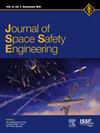Space safety in the age of LEO constellations: The role of spectrum management
IF 1.7
Q3 ENGINEERING, AEROSPACE
引用次数: 0
Abstract
The rapid expansion of low-earth orbit (LEO) satellite constellations has heightened spectrum interference and collision risks, exposing limitations in the International Telecommunication Union’s (ITU) static spectrum allocation framework. This paper investigates these challenges, particularly for Mobile Satellite Services (MSS) applications such as direct-to-cell phone connectivity and discontinuous data transmission. Through a comparative analysis of regulatory approaches by the U.S. Federal Communications Commission (FCC) and the European Electronic Communications Committee (ECC), it identifies gaps in current spectrum management practices. The study proposes three adaptive solutions: (1) an enhanced time-sharing mechanism utilizing spectrum sensing and frequency hopping to minimize interference; (2) the establishment of international standards for dynamic spectrum sharing under the ITU to harmonize global policies; and (3) a multilateral governance framework, led by the United Nations, for integrated management of spectrum and orbital resources. These recommendations aim to mitigate interference risks, enhance international coordination, and ensure the secure and sustainable operation of space resources amidst the growing proliferation of LEO constellations.
低轨道星座时代的空间安全:频谱管理的作用
近地轨道(LEO)卫星星座的快速扩张加剧了频谱干扰和碰撞风险,暴露了国际电信联盟(ITU)静态频谱分配框架的局限性。本文研究了这些挑战,特别是移动卫星服务(MSS)应用,如直接到手机连接和不连续数据传输。通过对美国联邦通信委员会(FCC)和欧洲电子通信委员会(ECC)的监管方法的比较分析,它确定了当前频谱管理实践中的差距。研究提出了三种自适应解决方案:(1)利用频谱感知和跳频的增强分时机制来减少干扰;(2)制定国际电联框架下的动态频谱共享国际标准,以协调全球政策;(3)以联合国为首的频谱和轨道资源综合管理多边治理框架。这些建议旨在减少干扰风险,加强国际协调,并在LEO星座日益扩散的情况下确保空间资源的安全和可持续运行。
本文章由计算机程序翻译,如有差异,请以英文原文为准。
求助全文
约1分钟内获得全文
求助全文
来源期刊

Journal of Space Safety Engineering
Engineering-Safety, Risk, Reliability and Quality
CiteScore
2.50
自引率
0.00%
发文量
80
 求助内容:
求助内容: 应助结果提醒方式:
应助结果提醒方式:


